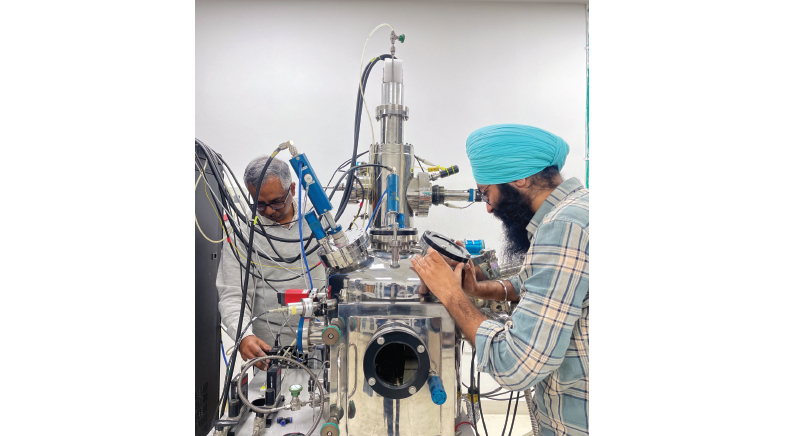AI all the way
-
- from Shaastra :: vol 03 issue 05 :: Jun 2024

Start-ups zero in on speedy processes, phonemes and weather forecasts.
WeatherCast Solutions
Founders: Sridhar Balasubramanian and Swetha M. Sridhar
Year: 2022
Big idea: Combining meteorology, big data and AI/ML for hyperlocal weather forecasting
Sridhar Balasubramanian had always been interested in the science behind weather forecasting. A mechanical engineer with a PhD from Arizona State University, he was drawn to geophysical fluid dynamics, a branch of science dealing with synoptic systems and meso-scale processes in oceans and the atmosphere, and their impact on weather patterns. "I got really interested (in)... chaotic weather systems... and how challenging it was to predict the weather," says Balasubramanian, a former scientist at Los Alamos National Laboratory, U.S., and now on the faculty at the Indian Institute of Technology (IIT) Bombay.
Balasubramanian often wondered why not much effort had been made to forecast the weather accurately in a city like Mumbai, prone to flooding during the monsoons. With some of his students, he started looking at how they could intelligently blend meteorology, data and deep learning techniques to significantly improve weather forecasting, especially at hyperlocal scales. The forecasts offered currently by global weather models are for a large region (typically a 10-km or 25-km block), but the hyperlocal variations even within a 2-km area were huge. Hence, it was important to predict the weather with high granularity.
They came up with an artificial intelligence (AI) and machine learning (ML) model by exploiting the benefits of meteorology, data and neural networks. This led Balasubramanian to incorporate WeatherCast Solutions with his wife, Swetha M. Sridhar, who did her Master's in Environmental Engineering from the U.S.
Incubated at the Society for Innovation and Entrepreneurship, IIT Bombay, WeatherCast Solutions uses data and AI/ML for an accurate forecast — with specific details about the weather. For example, instead of just forecasting rain, it predicts how much rain to expect, and exactly where. The forecast is done well ahead of time, mentioning the hotspots where action needs to be taken, he says. The technology can predict any meteorological variable – be it temperature, humidity, wind or irradiance.
The building block of WeatherCast's technology is historical data, which, in combination with meteorology, is built into the models and neural networks. Meteorological parameters are measured using IoT (Internet of Things) Automatic Weather Stations that the company builds and deploys on the ground. The physics-based AI/ML learning is then fed into the prediction engine for an output, he says. With the help of ground weather stations, it creates a spatial map of real-time data and uses that on the model that has already been trained on historical data.
The company has received an Indian patent for its technology. It has deployed weather stations in about a dozen places across the country. Its users include farmers who want weather forecasts for their farms. The company hopes to draw more players in the agriculture field and renewable energy companies.
Fourie (by SyncSense)
Founders: Vibhor Saran and Vishal Bhalla
Year: 2022
Big idea: Using Generative AI to provide content in local languages
It was while watching Mary Kom spar on television that an idea struck Vibhor Saran. He wondered why the commentary for the boxing match was only in English or Hindi and not in local languages. Why could it not be in the language of Manipur, the State the Olympian came from?
An engineering graduate in Information Technology, Saran worked in a couple of start-ups before joining a programme for entrepreneurs, which is where he met Vishal Bhalla, a Technical University Munich graduate, who was also a part of the team that launched Hindi for Alexa. With Bhalla, Saran went on to found SyncSense Technologies, incubated at the Indian Institute of Science.

The partners had realised early on that the issue they started with – the fact that people from Kom's own State could not relate to the language being aired – was not confined to sports, but spanned other fields, including entertainment and knowledge. They found out that a vast majority of Internet users in India preferred content in their own languages, but the bulk of it was in English. There was a huge market for content in local languages, and this demand was only going to increase. "We believed that localisation would be the key to bridge the gap between desired content and what was being created," Saran says. In their customer conversations, they learnt that businesses had already attempted to use artificial intelligence (AI) techniques to dub content, but the method was tedious, and the outcome sounded robotic and lacked the emotive factor that would make it engaging.

So, in August 2023, they launched their product Fourie Studio, named after the renowned mathematician Joseph Fourier. They spent a year researching the use of Generative AI for cloning a person's voice, especially in Indian languages. Every language has certain phonemes attached to it and these phonemes are used to draw a Mel Spectrogram, which is how the human ear perceives sound, Saran explains. The company takes a speech and the associated text and uses phonemes to train its models. To illustrate this, he plays a line spoken by actor Shah Rukh Khan in Hindi in a film, and its English translation, which has the same intonation and emotive aspect as the original dialogue.
Fourie is a SaaS product that is available in more than 40 languages, some in different accents as well, Saran says. Since its launch, it has registered more than 1,000 sign-ups on its platform. There are more than 70 paid users and the company is focused on the B2B segment. Fourie helps users to dub, add subtitles and narrate content in multiple languages. Its use cases include media and entertainment, e-learning, narration, gaming, animation and infotainment, he says.
SciDentAi
Founders: Abhishek Singh and Madhaw Anand
Year: 2021
Big idea: Using AI for accelerated development of new materials and optimising manufacturing processes
Abhishek Singh was instrumental in developing aNANt, India's first, and the world's largest, freely available 2D-computational materials database. It led the Bengaluru-based Professor at the Materials Research Centre, Indian Institute of Science (IISc), to work with defence laboratories on structural and functional materials. And this gave shape to his idea of helping manufacturing companies improve their processes with the use of artificial intelligence (AI), while also enabling them to discover new materials at an accelerated pace.

The twin objectives prompted Singh to found SciDentAi with Madhaw Anand, who had extensive experience in the steel industry and whom he had known for long. "We started developing machine learning models and algorithms to build models that are highly predictive, which can help accelerate the development of new materials," says Singh, who has a Master's in Physics from the Indian Institute of Technology (IIT) Delhi and a PhD in Computational Materials Science from Tohoku University, Japan.

Incubated at IISc, SciDentAi went through a process of customer discovery at the Gopalakrishnan-Deshpande Centre for Innovation and Entrepreneurship at IIT Madras. Within months, a major steel-producing company had signed up as its first customer, Singh says. SciDentAi has developed a SaaS platform that will help manufacturing companies optimise their industrial processes and cut down their fuel and carbon footprint. "Sustainability is our main DNA," Singh says.

The start-up also aims at helping companies develop new materials using AI-driven computational methods. Usually, the process of developing materials takes two to three decades, but SciDentAi's method will help companies complete the process within a year, he says. Both these processes have been validated by the industry. The company is talking to a few more leading producers of steel and aluminium in India and abroad as potential customers.

According to Singh, the company will look at process industries such as copper, polymers, chemicals, petrochemicals and cement in the future. These are high-polluting industries and helping them cut down their carbon footprint will play a major role in protecting the environment.
SciDentAi has developed a platform to help manufacturing companies optimise their processes and cut down their carbon footprint.
SciDentAi – the name is derived from Science-Driven Enterprise Artificial Intelligence – seeks to deal with the pain points of these industries using core knowledge combined with AI tools and computational modelling technologies. Singh asserts that there is a global market for their product. It has signed up a few partners and is in the process of enlisting more for markets such as South-East Asia, the Gulf region and Europe. Singh says investors are interested and SciDentAi is looking to raise funds to scale up operations over the next 12 months.
Have a
story idea?
Tell us.
Do you have a recent research paper or an idea for a science/technology-themed article that you'd like to tell us about?
GET IN TOUCH














